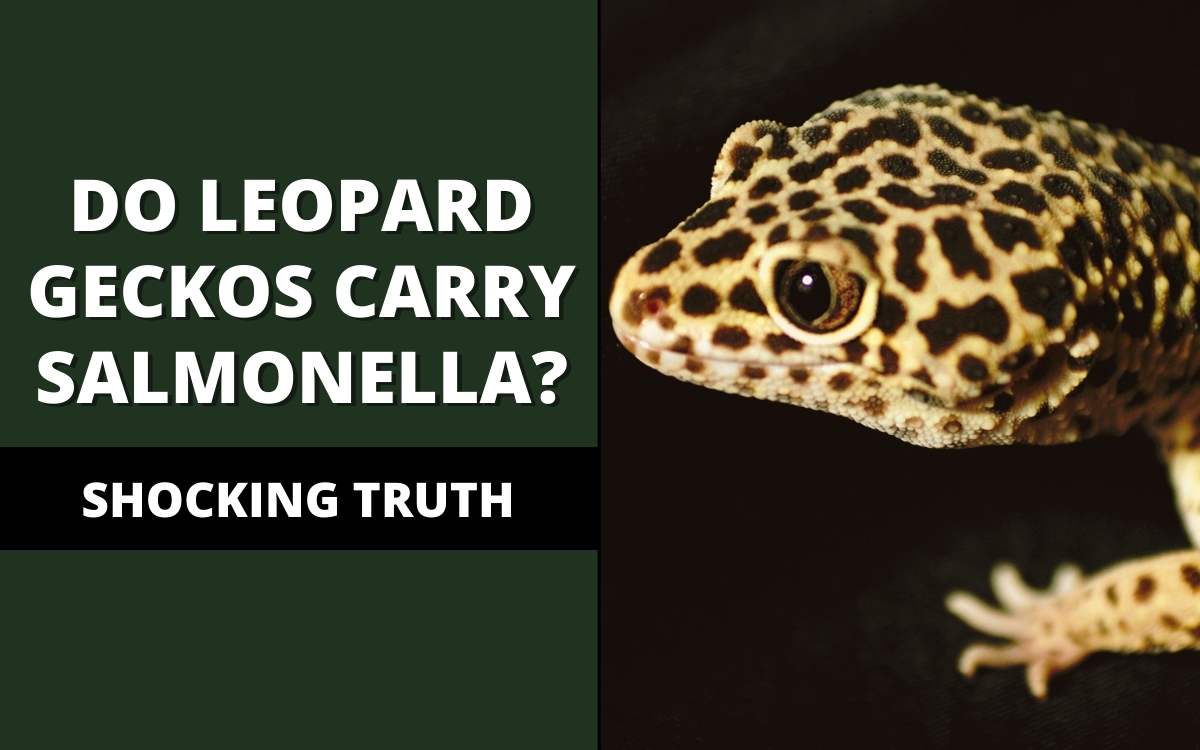Disclaimer: As an Amazon Associate I earn from qualifying purchases. Therefore, we may collect a share of sales from the links on this page, at no extra cost to you!

Do leopard geckos carry Salmonella? Can it be spread to humans? Keep reading to learn more about leopard geckos and Salmonella!
The last thing you want is to get infected with Salmonella, and your leopard gecko is in danger. Thus, many people question whether leopard geckos can carry Salmonella.
Today we’re going to take a closer look at salmonella and leopard geckos.
We’ll answer questions such as:
- What is Salmonella?
- Do leopard geckos carry Salmonella?
- Is Salmonella deadly?
- Other diseases leopard geckos are prone to
Keep reading to learn more!
Jump to..
Looking into Salmonella: Do Leopard Geckos Carry Salmonella?
What exactly is Salmonella? Salmonella is a widespread disease that many associates with reptiles and other animals. However, humans can develop it as well. Salmonella bacteria tend to live in animal and human intestines.
It is easy for people to get infected through contact with water or food. Symptoms can develop rather quickly and typically involve diarrhea, abdominal cramps, and fever.
So that leads us back to the question of whether leopard geckos carry Salmonella. The short and brief answer is leopard geckos do not carry Salmonella. Captive leopard geckos can carry diseases that can spread to humans. However, fortunately, Salmonella is not one of them.
Common Diseases in Leopard Geckos
As a human, you usually are pretty safe around your leopard gecko. However, it is best to get your leopard gecko to a vet if they display signs and symptoms of diseases or infections.
How do you know that your leopard gecko is infected? There are a few indications that the leopard gecko gives when sick.
A healthy leopard gecko sheds regularly. If you see signs of difficulty shedding, it can mean another issue at hand. It is best to soak and spray areas where they are struggling to shed. Otherwise, leopard geckos can lose their toes due to stuck sheds.
When a Leopard Gecko gets Metabolic Bone Disease, you can see it through distorted limbs and difficulty raising its body from the ground. This is very easy to avoid by dusting its food with calcium powder and making sure its diet is rich in vitamin D3. In short, MBD affects bone development and can lead to death if left untreated.
How to Keep Your Leopard Gecko Healthy?
It is best to ensure everything in your leopard geckos enclosure is working. The temperature within the tank is crucial for your leopard gecko’s well-being. Ensure to feed your leopard gecko regularly and keep your leopard gecko in a clean environment to avoid bacteria. Otherwise, it may develop parasites.
Wrapping up: Can Leopard Geckos get Salmonella?
Leopard geckos are genuinely one of the most joyful and unique pets to have. It is a relief that they are not carriers of such dangerous infectious bacteria. However, that does not mean you’re out of the dark with your leopard gecko.
It merely means that you have one less thing to worry about. However, the more you focus on keeping everything in check, the longer your leopard gecko will live and the less likelihood your pet will become ill. This means taking proper care of your leopard gecko. Provide your leopard gecko with the appropriate diet, give them calcium, clean their tanks, and handle them regularly!
After all, it works very much the same as us; we need to eat regularly, exercise, and stay stress-free to remain healthy. All of these things also apply to our pets!
Be sure to check out our comprehensive care guide to ensure you’re providing your leopard gecko with the perfect care!
